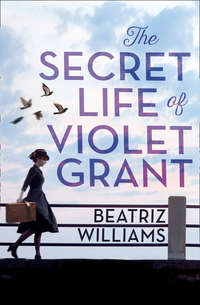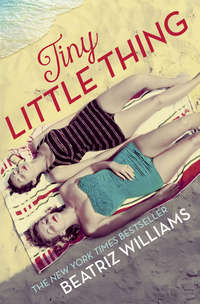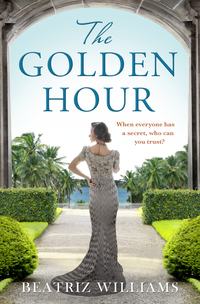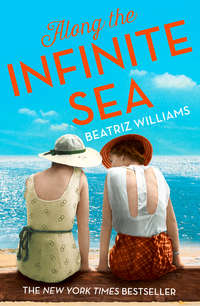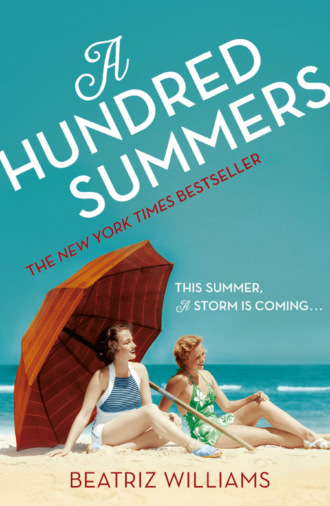
Полная версия
A Hundred Summers: The ultimate romantic escapist beach read
“Mrs. Hubert says cigarettes are coffin nails,” said Kiki, drawing in the sand with her toe.
“Mrs. Hubert is an old biddy.” Aunt Julie took another drag. “My doctor recommends them. You can’t get healthier than that.”
Kiki stood up. “I want to play in the surf. I haven’t played in the surf in months. Years, possibly.”
“It’s too cold, sweetie,” I said. “The water hasn’t had a chance to warm up yet. You’ll freeze.”
“I want to go anyway.” She put her hands on her hips. She wore her new beach outfit, all ruffles and red polka dots, and with her dark hair and golden-olive skin and fierce expression she looked like a miniature polka-dotted Polynesian.
“Oh, let her play,” said Aunt Julie. “The young are sturdy.”
“Why don’t you build a sand castle instead, sweetie? You can go down to the ocean to collect water.” I picked up her bucket and held it out to her.
She looked at me, and then the bucket, considering.
“You build the best castles,” I said, shaking the bucket invitingly. “Show me what you’ve got.”
She took the bucket with a worldly sigh and started down the beach.
“You’re good with her,” said Aunt Julie, smoking luxuriously. “Better than me.”
“God did not intend you to raise children,” I said. “You have other uses.”
She laughed. “Ha! You’re right. I can gossip like nobody’s business. Say, speaking of which, did you hear Budgie’s opening up her parents’ old place this summer?”
A wave rose up from the ocean, stronger than the others. I watched it build and build, balancing atop itself, until it fell at last in a foaming white arc, from right to left. The crash hit my ears an instant later. I reached for Aunt Julie’s cigarette and stole a long and furtive drag, then figured What the hell and reached for the pack myself.
“They’re arriving next week, your mother says. He’ll come down on weekends, of course, but she’ll be here all summer.” Aunt Julie tilted her face upward and gave her hair a shake. It shone golden in the sun, without a single gray hair that I could detect. Mother insisted she dyed it, but no hair dye known to man could replicate that sun-kissed texture. It was as if God himself were abetting Aunt Julie in her chosen style of life.
Down at the shoreline, Kiki waited for the wave to wash up on the sand and dipped her bucket. The water swirled around her legs, making her jump and dance. She looked back at me, accusingly, and I shrugged my told-you-so shoulders.
“Nothing to say?”
“I’m looking forward to seeing her again. It’s been years.”
“Well, she’s got the money now. She might as well spruce up the old place. You should have seen the wedding, Lily.” She whistled. Aunt Julie had gone to the wedding, of course. No party of any kind among a certain segment of society would be considered a success without an appearance by Julie van der Wahl, née Schuyler—known to the New York dailies simply as “Julie”—and her current plus-one.
“I read all about it in the papers, thanks.” I blew out a wide cloud of smoke.
Aunt Julie nudged me with her toe. “Bygones, darling. Everything works out for the best. Haven’t I been trying to teach you that for the past six years? There’s nothing in the world you can count on except yourself and your family, and sometimes not even them. God, isn’t it a glorious day? I could live forever like this. Just give me sunshine and a sandy beach, and I’m as happy as a clam.” She stubbed out her cigarette in the sand and lay back on the blanket. “You don’t have a whiskey or something in that basket of yours, do you?”
“No.”
“Thought not.”
Kiki staggered back toward us with her pail full of water, sloshing over the sides. Thank God for Kiki. Budgie might have had everything in the world, but at least she didn’t have Kiki, all dark hair and spindly limbs and squinting eyes as she judged the distance back to the blanket.
Aunt Julie rose back up on her elbows. “Now, what are you thinking about? I can hear the racket in your brain all the way over here.”
“Just watching Kiki.”
“Watching Kiki. That’s your trouble.” She lay back down and crossed her arm over her face. “You’re letting that child do all the living for you. Look at you. It’s disgraceful, the way you’ve let yourself go. Look at that hair of yours. I’d shave mine off before I let it look like that.”
“Tactful as ever, I see.” I stubbed out my half-finished cigarette and opened up my arms to receive Kiki, who set her pail down in the sand and flung herself at me. Her body was sun-warmed, smelling of the sea, smooth and wriggling. I buried my face in her dark hair and inhaled her childish scent. Why didn’t adults smell so sweet?
“You have to help me.” Kiki detached herself from me, grabbed her bucket, and spilled the water thoroughly over the sand. Last summer, we built an archipelago of castles all over this beach, an ambitious program of construction that ended in triumph at the annual Seaview Labor Day Sand Castle Extravaganza.
I’ll tell you, the things we got up to in Seaview.
I let Kiki pull me up from the blanket and knelt with her on the sand. She handed me a shovel and told me to start digging, Lily, digging, because this was going to be a real moat.
“We can’t have a real moat this far from the water,” I said.
Kiki said, “Let the child have her fun.”
“And what is that thing you’re wearing, that abomination? Don’t you have a bathing suit?” asked Aunt Julie.
“This is my bathing suit.”
“Lord preserve us. You’re going to let Budgie Byrne see you in that?”
I dug my shovel ferociously into the moat. “She’s not a Byrne anymore, is she?”
“Ah. So you are holding it against her.”
I stopped digging and rested my hands on my knees, which were covered by the thick cotton of my black bathing suit. “Why shouldn’t Budgie get married? Why shouldn’t anybody get married, if she wants to?”
“Oh, I see. We’re back to bygones again. Where are those cigarettes? I could use another cigarette.”
“The child can hear you,” Kiki reminded us. She turned her pail over and withdrew it to reveal a perfect castle turret.
“That’s lovely, darling.” I shoveled sand upward from the moat excavation to form a wall next to the tower. For an instant I paused, wondering if I was angry enough to shape it into battlements.
Aunt Julie rummaged through the basket, looking for the Chesterfields. “Did I tell you to bury yourself with your corpse of a mother for the past six years? No, I did not. Live a little, I told you. Make something of yourself.”
“Kiki needed me.”
“Your mother could have looked after her just fine.”
Kiki and I both stared at Aunt Julie. She had found the cigarettes and held one now between her crimson lips as she fumbled for the lighter. “What?” she asked, looking first at me and then at Kiki. “All right, all right,” she conceded, holding the flame up to the cigarette. “But you could have hired a nanny.”
“The child does not wish to be raised by a nanny,” said Kiki.
“Mother has enough to do, with all her charity projects,” I said.
“Charity projects,” Aunt Julie said, as if it were an obscenity. “If you ask me, which you never do, it’s a bad sign when a woman spends more time looking after orphans than her own family.”
“She looks after Daddy,” I said.
“You don’t see her looking after him now, do you?”
“It’s summer. We always come to Seaview in the summer. It’s how Daddy would want it.”
Aunt Julie snorted. “Has anybody asked him?”
I thought of my father in his pristine room, staring at the wall of books that used to give him such pleasure. “That’s not nice, Aunt Julie.”
“Life’s too short for nice, Lily. The thing is, you’re wasting yourself. Everyone has a little bump in the road when they’re young. God knows I had a few. You pick yourself up. Move on.” She offered me the cigarette, and I shook my head. “Let me cut your hair tonight. Trim it a bit. Put some lipstick on you.”
“Oh, do it, Lily!” Kiki turned to me. “You’d look beautiful! Can I help, Aunt Julie?”
“Don’t be silly,” I said. “Everyone knows me here. If you put lipstick on me, they won’t let me into the club. Anyway, dress myself up for whom? Mrs. Hubert? The Langley sisters?”
“Someone’s bound to have an unmarried fellow down for the weekend.”
“Then you’ll have him running for your gin and tonic before I can stick you with my hatpin.”
Aunt Julie waved her hand in dismissal, trailing a coil of smoke. “Scout’s honor.”
“Oh, you’re a Girl Scout now, are you? That’s rich.”
“Lily, darling. Let me do it. I need a project. I’m so desperately bored out here, you can’t imagine.”
“Then why do you come?”
She wrapped her arms around her knees, staring out at the ocean, cigarette dangling ash into the sand. The wind ruffled her hair, but only at the tips. “Oh, it keeps the beaus on their toes, you know. Disappearing for a few weeks every year. Even I wouldn’t dare bring a boyfriend to Seaview. Mrs. Hubert still hasn’t forgiven me for my divorce, the old dear.”
“None of us have forgiven you for your divorce. Peter was such a nice fellow.”
“Too nice. He deserved better.” She jumped to her feet and tossed the cigarette in the sand. “It’s settled, then. I’m taking you in hand tonight.”
“I don’t remember agreeing to that.”
Aunt Julie’s crimson lips split into a thousand-watt smile, the one the New York papers loved. She was nearing forty now, and it crinkled up the skin around her eyes, but nobody really noticed the crinkling with a smile as electric as Aunt Julie’s. “Darling,” she said, “I don’t remember asking your permission.”

LIFE IN SEAVIEW revolved around the club, and the club revolved around Mrs. Hubert. If you asked any Seaview resident why this should be so, you’d be met with a blank stare. Mrs. Hubert had been around so long, no one could remember when her reign began, and considering her robust state of health (“vulgar, really, the way she never sits down at parties,” my mother said), no one would hazard a guess to its end. She was the Queen Victoria of summertime, except she never wore black and stood as tall and thin as a gray-haired maypole.
“Why, Lily, my dear,” she said, kissing my cheek. “What have you done with your hair tonight?”
I touched the chignon at the nape of my neck. “Aunt Julie put it back for me. She wanted to cut it, but I wouldn’t let her.”
“Good girl,” said Mrs. Hubert. “Never take fashion advice from a divorcée. Now, Kiki, my sweet.” She knelt down. “Do you promise to be a good girl tonight? I shall have you blackballed if you aren’t. We are young ladies at the club, aren’t we?”
Kiki put her arms around Mrs. Hubert’s neck and whispered something in her ear.
“Very well,” said Mrs. Hubert, “but only when your mother’s not looking.”
I glanced back at Mother and Aunt Julie, who had been stopped by an old acquaintance in the foyer. “Are you sitting out on the veranda this evening? It’s so lovely and warm.”
“With this surf? I should think not. My hearing is not what it was.” Mrs. Hubert gave Kiki a last pat and rose up with all the grace of an arthritic giraffe. “But off you go. Oh, no. Wait a moment. I meant to ask you something.” She placed a hand on my elbow and drew me close, until I could smell the rose-petal perfume drifting from her skin, could see the faint white lines of rice powder settling into the crevasses of her face. “You’ve heard about Budgie Byrne, of course.”
“I’ve heard she’s opening up her parents’ old place for the summer,” I said coolly.
“What do you think of it?”
“I think it’s high time. It’s a lovely old house. A shame it sat empty so long.”
Mrs. Hubert’s eyes were china blue, and hadn’t lost a single candlepower since she first spanked my bottom for uprooting her impatiens to decorate my Fourth of July parade float when I was about Kiki’s age. She examined me now with those bright eyes, and though I knew better than to flinch, the effort nearly did me in. “I agree,” she said at last. “High time. I’ll see she doesn’t give you any trouble, Lily. That girl always did bring trouble trailing behind her like a lapdog.”
“Oh, I can handle Budgie. I’ll see you later, Mrs. Hubert. I’m taking Kiki for her ginger ale.”
“I’m getting ginger ale?” Kiki skipped along behind me to the bar.
“Tonight you are. Gin and tonic,” I told the bartender, “and a ginger ale for the young lady.”
“But which is which?” The bartender winked.
College boy.
He plopped a cherry in Kiki’s ginger ale, and I strolled out on the veranda with her pink palm in mine, waiting for Mother and Aunt Julie to join us.
The surf was high, crashing in ungentle rollers into the beach below us. When I set my drink on the railing and braced my hands against the weathered wood, the salt spray stung like needles against my bare arms and neck. The dress was Aunt Julie’s choice, a concession made necessary to avoid the threatened haircut, and though she’d clucked with dismay over the sturdy cotton and floral print, she accepted it as the best of a bad lot, and did her damnedest to yank the neckline down as far as physics allowed. “We’re going to throw out the whole kit tomorrow,” she’d said. “Burn it all. I don’t want to see a single flower on you, Lily, unless it’s a great big gerbera daisy, a scarlet one, pinned to your hair. Just above the ear, I think. Now, that would be splendid. That would out-Budgie goddamned Budgie herself.”
Kiki popped up between my arms and leaned back against the veranda railing, staring up at me, her hand tugging my dress. “Who is Budgie Byrne,” she asked, “and is she really as much trouble as Mrs. Hubert says?”
“You shouldn’t listen to grown-up conversations, sweetie.”
She sucked her ginger ale and made a show of looking around. “I don’t see any other children here, do I?”
She was right, of course. For whatever reason, my generation hadn’t taken up in our parents’ houses in Seaview, as had every generation past, filling the narrow lanes and tennis courts with screaming young children and moody teenagers, with sailboats racing across the cove and Fourth of July floats festooned in contraband impatiens. I could understand why. The things that attracted me back to Seaview every summer—its old-fashionedness, its never-changingness, its wicker furniture and the smell of salt water soaked into its upholstery—were the very things that turned away everyone else. You couldn’t satisfy your craving for slickness and glamour and high living here at the Seaview Club. During Prohibition, the liquor had been replaced by lemonade, and now that the gin and tonic were back in their rightful places, the young people had moved on.
Except me.
So Kiki was the youngest person at the club this evening, and I was the second-youngest, and the two of us stood there on the early-evening veranda, watching the surf come in, with nowhere else to go. I didn’t mind. There were worse places to spend your time. The veranda stretched the full length of the club and wrapped around the sides, with the long drive at one end and the rest of the Seaview Association on the other, cottage after cottage, porch lights winking out to sea. I knew this scene in my bones. It was safety. It was family. It was home.
Kiki was saying something else, and another wave thundered onto the beach below, but somehow through it all I heard, quite distinctly, the sound of a car engine making the final curve before its approach to the circular drive out front.
I couldn’t say, later, why the noise should have leaped out at me like that, out of all the cars making their way to the Seaview Club that evening. I didn’t believe in fate, didn’t hold any truck with foresight or even intuition. I called it coincidence alone that my ear followed the progress of that car around the corner of the club, picked out the low rumble as it idled outside the entrance, heard with startling precision the sound of Budgie Byrne’s voice, one week early, sliding into a high and tinkling laugh through the clear air, and a deep male voice answering her.
Of course, she wasn’t Budgie Byrne anymore, I reminded myself. It was all my numb mind could come up with.
I grabbed my drink, grabbed Kiki’s hand.
“Your hands are cold,” she exclaimed.
I strode toward the blue-painted steps leading down to the beach. “Let’s go for a walk.”
“But my ginger ale!”
“I’ll order you another.”
I swallowed the rest of my gin and tonic as we walked down the steps, holding up my long skirt so I wouldn’t trip. By the time we reached the bottom, the glass was empty, and I left it there, balanced near the edge, where no one would tread on it accidentally.
“Are the others coming, too?” Kiki accelerated into a skip by my side. Any break from routine made her giddy with excitement.
“No, no. Just a little walk, the two of us. I want …” I paused. The gin was rising to my head in a rush. “I want to see how the club lights look from the end of the beach.”
As an explanation, it suited her six-year-old imagination perfectly. “Tally-ho, then!” she said, swinging our joined hands. Her flat shoes skimmed along the sand, while my heeled sandals sank in at every stride. Within a hundred yards, I was gasping for breath.
“Let’s stop here,” I said.
She tugged at my hand. “But we’re not at the end of the beach yet!”
“We’re far enough. Besides, we’ve got to go back before Mother and Aunt Julie start looking for us.”
Kiki made an unsatisfied noise and plopped down in the sand, stretching her feet toward the water. “Oh, Lily,” she said, “look at this shell!” She held up a spiral conch, miraculously intact.
“Look at that! May’s a good time for beachcombing, isn’t it? Nothing’s been picked over yet. Make sure you save that one.” I reached down and took off my shoes, one by one, hopping on each foot. The sand pooled around my toes; the water foamed up with alluring proximity. The tide had nearly reached its peak. I watched it undulate, back and forth, until my breathing began to slow and my heart to steady itself. Something bitter rose in the back of my throat, and my brain, unleashed and candid with the gin, recognized the taste of shame.
So, there it was. I had imagined this encounter over and over, wondered what I should do. Had thought of the clever things I’d say, the way I’d hold my ground with an insouciant toss of my head. The way Aunt Julie would have done.
Instead, I had run away.
“Can I take off my shoes and look for more shells in the water?” asked Kiki.
I looked down. She had arranged a circle of small dark clamshells around the conch, like supplicants before a shrine.
“No, darling. We have to go back.”
“I thought we were going to look at the lights.”
“Well, look. There they are. Isn’t it pretty?”
She turned toward the clubhouse, which perched near the beach, lights all ablaze in preparation for sunset. The weathered gray shingles camouflaged it perfectly against the sand. Behind the rooftop, the sun was dipping down into the golden west.
“It’s beautiful. We’re so lucky to live here every summer, aren’t we?”
“Very lucky.” The voices carried across the beach, too far away to distinguish. I was unbearably conscious of my own cowardice. If Kiki knew, if she understood, she would be ashamed of me. Kiki never turned away from a challenge.
I took her hand. “Let’s go back.”
By the time we reached the veranda again, I had planned everything out. I would secure a table on this end, the far end, sheltered, tucked around the corner from view. I would send Kiki to find Mother and Aunt Julie, while I let the club manager know where we were eating tonight. The surf, I’d say, was too fierce for Mother.
After our meal, we’d pass through the rest of the veranda, greeting acquaintances, and when we reached her table I’d be composed, settled into the routine of shaking hands and expressing admiration for new hairstyles and new dresses, of lamenting the loss of elderly members during the past year, of celebrating the arrival of new grandchildren: the same conversation, the same pattern, evening after evening and summer after summer. I knew my lines by heart. A minute, perhaps two, and we’d be gone.
Kiki skipped up the steps ahead of me, and I leaned down to pick up my empty glass. My hair spilled away from Aunt Julie’s pristine chignon, loosened by the sea air and its own waywardness. I pushed it back over my ear. My cheeks tingled from the spraying surf and the brisk walk. Should I visit the powder room, return myself to orderliness, or was it too great a risk?
“Why, hello,” said Kiki, from the top of the stairs. “I haven’t seen you around before.”
I froze, bent over, my hand clutched around the smooth, round highball glass as if it were a life buoy.
An appalling silence stretched the seconds apart.
“Well, hello, yourself,” said a man’s voice, gently.
Конец ознакомительного фрагмента.
Текст предоставлен ООО «ЛитРес».
Прочитайте эту книгу целиком, купив полную легальную версию на ЛитРес.
Безопасно оплатить книгу можно банковской картой Visa, MasterCard, Maestro, со счета мобильного телефона, с платежного терминала, в салоне МТС или Связной, через PayPal, WebMoney, Яндекс.Деньги, QIWI Кошелек, бонусными картами или другим удобным Вам способом.






